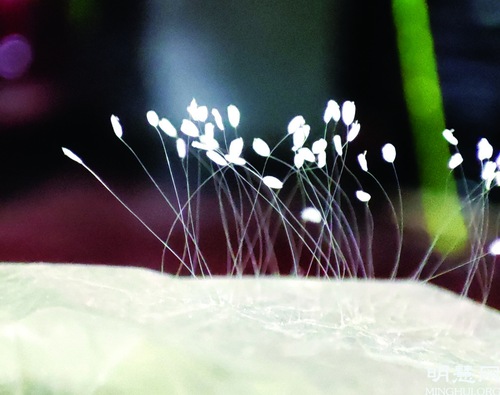(Minghui.org) Xiaofen, a woman in her sixties in a small village near Shijiazhuang City, Hebei Province, has been practicing Falun Dafa for over 20 years. She is an easygoing, cheerful, and healthy fruit farmer.
Every year, Xiaofen covers her apples with small plastic bags in early summer to shield them from bugs, rain, harsh sunshine, and pollution. Her hard work brings her good harvests every fall.
As Xiaofen was picking apples in September, 2020, she was happily surprised to find more than 40 udumbara flowers in a plastic bag that covered a big, ripe apple. She shook the bag, but the flowers didn’t fall out. Xiaofen piously put this plastic bag on her offering table in front of a portrait of Master Li Hongzhi, the founder of Falun Dafa, and she hasn’t moved it since.
 The udumbara flowers remain as beautiful as they were initially found (photo taken in early June 2021).
The udumbara flowers remain as beautiful as they were initially found (photo taken in early June 2021).
According to Buddhist scriptures, the udumbara is a sacred flower from Buddhas’ paradises. It is said to bloom only once every 3,000 years, and its appearance indicates that the Holy King Who Turns the Wheel is in the human world. In recent years, this rare flower has been found on objects including steel pipes, wood, glass windows, etc.
Falun Dafa, a traditional cultivation practice of the Buddha School, has been introduced to over 100 countries around the world. Practitioners of Falun Dafa cultivate themselves according to the principles of Truthfulness-Compassion-Forbearance.
Views expressed in this article represent the author's own opinions or understandings. All content published on this website are copyrighted by Minghui.org. Minghui will produce compilations of its online content regularly and on special occasions.








